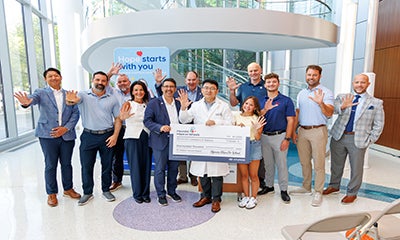Children’s of Alabama Receives $100,000 Research Grant from Hyundai Hope on Wheels
August 7, 2025
Categories: News
Tags: Alabama Center for Childhood Cancer and Blood disorders
BIRMINGHAM (Aug. 7, 2025) — Children’s of Alabama recently received a $100,000 research grant from Hyundai Hope on Wheels to advance pediatric cancer research. This contribution will support ongoing efforts to develop treatment options for pediatric brain tumors, including medulloblastoma. Dr. Zaili Luo was presented with a lab coat during a Hyundai Hope on Wheels handprint ceremony on Thursday, recognizing him as a grant recipient.
“It is great to see the community coming behind us and supporting what we do,” said Girish Dhall, MD, Director of the Division of Pediatric Hematology and Oncology. “It just increases the enthusiasm that we have in what we do every day. We are just trying to improve the lives of children with cancer and blood disorders at Children’s of Alabama.”
In its 27-year history, Hyundai Hope on Wheels has awarded more than $277 million in pediatric cancer research grants to children’s hospitals nationwide. More than 15,000 children are diagnosed with cancer each year in the United States. That’s why Hyundai Hope on Wheels and Children’s remain committed to helping children fight cancer by raising awareness and funding research.
"Hyundai Hope on Wheels is honored to support esteemed hospitals and institutions such as Children’s of Alabama to fund research that fosters innovation and medical advancements for pediatric cancer patients," said John Guastaferro, executive director, Hyundai Hope on Wheels. "We are grateful for the unwavering dedication and life-saving efforts that will bring us closer to a world without childhood cancer.”
The Alabama Center for Childhood Cancer and Blood Disorders is a partnership between Children’s of Alabama, the University of Alabama at Birmingham (UAB) Division of Pediatric Hematology, Oncology and Blood and Marrow Transplantation Program, the O’Neal Comprehensive Cancer Center at UAB and national childhood research groups, including the National Cancer Institute and the Children’s Oncology Group. The center cares for more than 2,000 children and young adults who have cancer, sickle cell disease and blood disorders.










